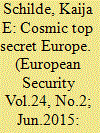|
|
|
Sort Order |
|
|
|
Items / Page
|
|
|
|
|
|
|
| Srl | Item |
| 1 |
ID:
137403


|
|
|
|
|
| Summary/Abstract |
As the EU has expanded its authority into areas of high politics such as monetary, defense, and foreign policy, it has simultaneously developed procedures for handling more sensitive and classified information. These critical policy domains require standards regulating secure information and personnel, but the concept of official secrets is in tension with the treaty norms of the EU. Observers allege that the classified information policy of the EU was imposed through the coercion of external actors such as North Atlantic Treaty Organization (NATO) and the USA in a significant historical departure from the information security policies of European member states. This article evaluates the content of EU-classified information policies and compares them to the content of European member states, NATO, and the USA, in an effort to clarify the mechanisms of policy diffusion in the area of information security.
|
|
|
|
|
|
|
|
|
|
|
|
|
|
|
|
| 2 |
ID:
166746


|
|
|
|
|
| Summary/Abstract |
EU defence policy has been extremely popular over the past three decades, averaging around 75% public support. In fact, no other policy domain is as popular and robust as the idea of pooling national sovereignty over defence. However, public support for EU defence has been dismissed as mere “permissive consensus”, rather than genuine support. Scholars have often assumed that public opinion towards European integration is passive and shallow, especially over foreign policy issues, where the public has limited understanding of the complexity of issues. Consistent with contemporary findings about the complexity of comparative foreign policy attitudes, the authors contest the permissive consensus logic and demonstrate that European publics have held coherent preferences over the use of force at the European level. The authors conclude that the slow progress of integration in this area is due to the reluctance of elites rather than to the reticence of Europe’s citizens.
|
|
|
|
|
|
|
|
|
|
|
|
|
|
|
|
| 3 |
ID:
156659


|
|
|
|
|
| Summary/Abstract |
Do considerations that cause military spending increases symmetrically cause spending cuts? Models of military spending that estimate a single effect for major independent variables implicitly assume that this is the case. In reality, the mechanisms that cause military spending increases do not always imply symmetrical cuts, and vice versa. This article examines two considerations widely held to influence military spending: economic growth and international threats. In both cases, there are reasons to suspect asymmetric effects on military spending. While recessions always create pressure for cuts in military spending, which frequently constitutes a substantial share of national budgets, economic growth does not necessarily imply a symmetric need for spending increases. Similarly, while national security policymakers, including the military, are likely to call for spending increases when international threats worsen, they have self-interested reasons to minimize the budgetary implications of declining threats. A cross-national analysis of military spending since World War II shows that economic decline has a larger impact on military spending than economic growth. In regards to international threat, the findings are more complex. There is no evidence that international threat is related to changes in military spending in the short run, and little evidence of a long-run relationship. The threat variables appear to account for cross-sectional variation in military spending but not variation within each state over time. These results suggest military budgets require more time to recover from economic decline than benefit from economic growth as recessions can thus produce long deviations from the equilibrium relationship between the size of the economy and the military budget. This finding in military spending suggests consequences for our understanding of balance of power and power transitions.
|
|
|
|
|
|
|
|
|
|
|
|
|
|
|
|
|
|
|
|
|